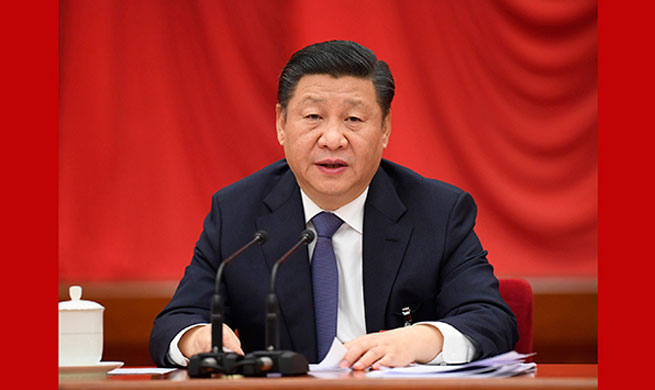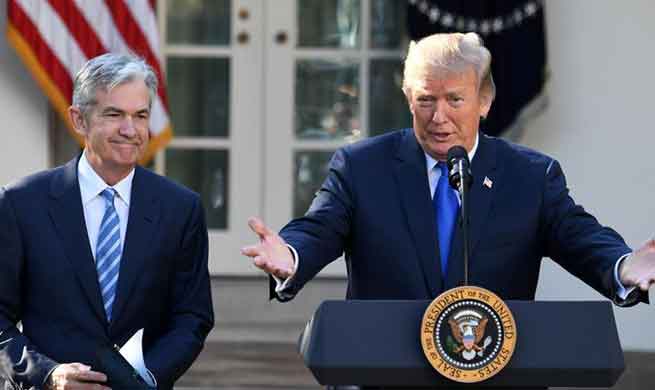by Christopher Guly
OTTAWA, Jan. 19 (Xinhua) -- The Canadian Chamber of Commerce is suggesting the more than 200,000 companies in its network renew any permits required to do business in the United States sooner than later in case U.S. President Donald Trump's administration scraps the 24-year-old North American Free Trade Agreement (NAFTA) between Canada, the United States and Mexico.
"We all live in hope that common sense will prevail at the end of the day," chamber president and chief executive officer Perrin Beatty, a former Canadian cabinet minister, said in an interview with Xinhua Friday.
"However, we're dealing with an administration that is very nativist and that is talking about putting impediments in the way of trade, which is not what we're doing in Canada. We see engaging American businesses as a positive thing."
Next Tuesday, American, Canadian and Mexican trade officials will convene in Montreal to begin the sixth round of talks to renegotiate NAFTA - a deal that Trump has opposed since his campaign for the presidency and which on Thursday he described as "a bad joke" on Twitter.
Retired Canadian diplomat Colin Robertson remains uncertain about the future of NAFTA, which he helped draft.
"If we were dealing with any other administration, I would say yes we would solve the differences. But because of Donald Trump, I don't know. On a daily basis, you wonder where he is coming from," said Robertson.
He said the U.S. president has recently sent mixed signals regarding Mexico, where he told the Wall Street Journal that he would be "flexible" on his threat to withdraw from NAFTA in light of this year's Mexican presidential election, yet also said that Mexico would pay for his much-promised U.S.-Mexico border wall "indirectly" through changes to the trilateral trade pact.
Beatty said that during negotiations for the 1988 bilateral trade deal between Canada and the United States that preceded NAFTA, the dynamics that played out between Ottawa and Washington, D.C. were "quite different" of what they are now between both capital cities.
He said there was "a very close personal" friendship between U.S. President Ronald Reagan, a Republican like Trump, and Canadian Prime Minister Brian Mulroney, a conservative in whose cabinet Beatty served at the time as defense minister.
"Without that relationship, the Canada-U.S. Free Trade Agreement wouldn't have been possible because there were so many vested interests that worked against trying to take down barriers and open up trade," Beatty explained.
"In this case, we have an existing agreement that by any empirical standard has been very beneficial to all three countries. Logic would say you need a compelling reason not to continue with it. Yet what we're dealing with here is a politically and ideologically driven approach to trade that often ignores the facts."
Robertson, an Ottawa-based vice-president of the Canadian Global Affairs Institute, a foreign policy think-tank headquartered in the western Canadian city of Calgary, noted that Trump and Canadian Prime Minister Justin Trudeau will be in Davos, Switzerland next week attending the World Economic Forum where NAFTA will likely be raised in any conversations between both leaders.
But ultimately the hard work will occur at the negotiating tables, and Robertson believes there are three possible outcomes to next week's talks in Montreal, which have been extended by one day to Jan. 29.
Either a deal will be reached and sent to the U.S. Congress for approval; or negotiations will be suspended at the end of March following their eighth round in Washington, and moved to technical discussions without ministerial meetings until 2019 after the Mexican presidential inauguration on Dec. 1; or Trump rescinds the agreement and U.S. Trade Representative Robert Lighthizer "will blame Canada and Mexico for failing to show a willingness to compromise," according to Robertson.
The latter scenario is plausible since neither Canada nor Mexico is willing to budge in their insistence that a NAFTA provision that allows for bi-national panels to review anti-dumping and countervailing duties remain. Trump's administration wants that dispute-resolution mechanism dropped and have U.S. courts as the final arbiter in challenges to American tariffs.

















